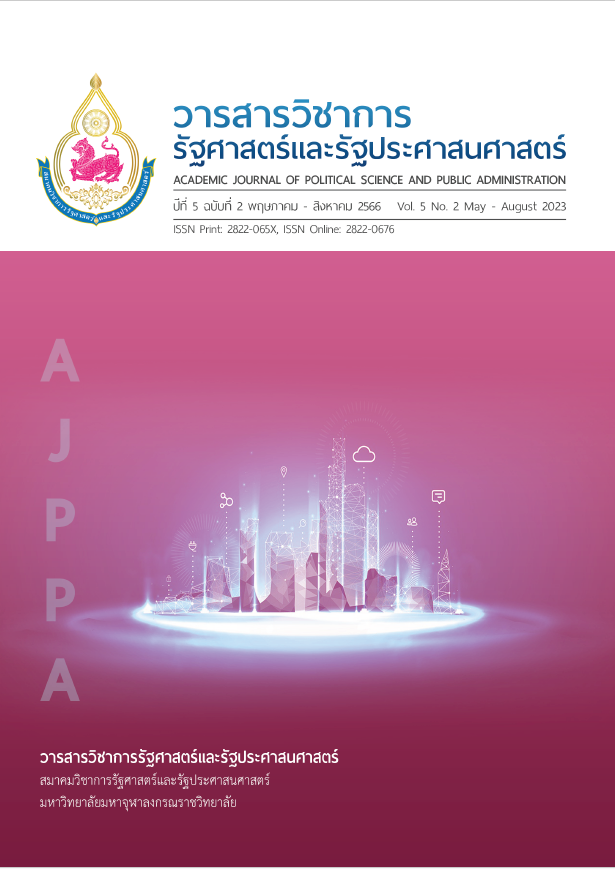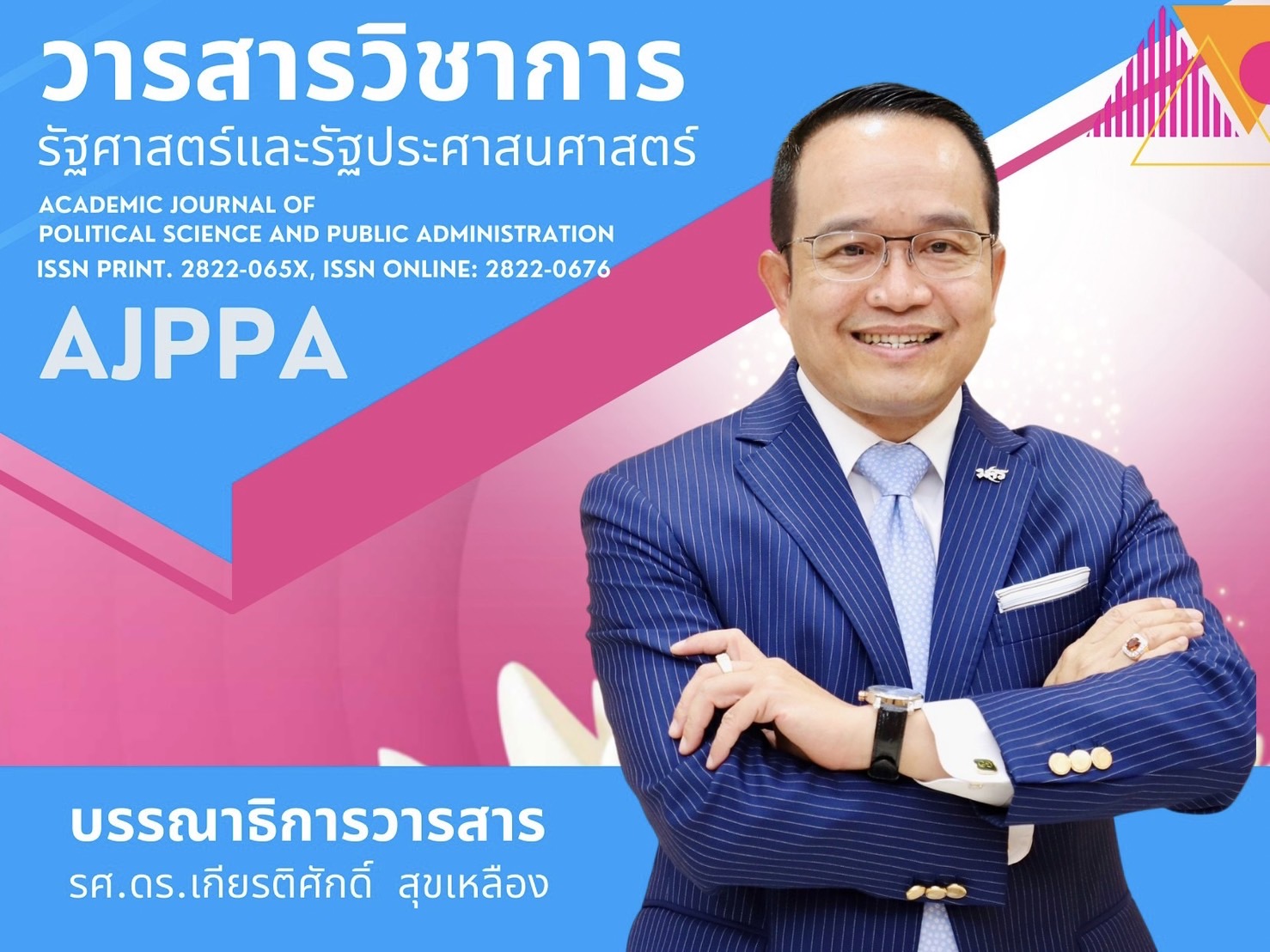ภาวะผู้นำ: การสื่อสารทางการเมืองตามหลักพุทธธรรม
คำสำคัญ:
ภาวะผู้นำ, การสื่อสารทางการเมือง, หลักพุทธธรรมบทคัดย่อ
การสื่อสารเป็นสิ่งสำคัญในถ่ายทอดแลกเปลี่ยนความคิด ความรู้สึก ความต้องการ ตลอดจนแสวงหาข้อมูลข่าวสารประกอบการตัดสินใจ หรือเพื่อแก้ไขปัญหา ปัจจุบันการสื่อสารทางการเมืองในประเทศไทยจะประสบปัญหาจากผู้สื่อสาร เนื่องจากผู้นำทางการเมืองในระดับต่าง ๆ ยังขาดทักษะในการสื่อสารซึ่งเป็นปัจจัยหลักมาจากข้อจำกัดหลายด้าน ผู้ส่งสารขาดทักษะในการเข้าถึงข้อมูลที่ไม่รู้จริง ดังนั้นหลักการสื่อสารทางการเมืองจึงเป็นที่จะต้องนำเสนอข้อมูลที่ทำให้คนที่มีส่วนได้ส่วนเสียเกิดความไว้วางใจโดยอาศัยวิธีการเต็มไปด้วยความเมตตากรุณา หลักพุทธศาสนาในการสื่อสารทางการเมืองให้มีความซื่อสัตย์ทั้งต่อหน้าและลับหลัง เพื่อธำรงไว้ในหลักการมีส่วนร่วมในทางการเมืองโดยยึดหลักการสื่อสารทางการเมืองเป็นพื้นฐานในการประกอบกิจต่าง ๆ ในสังคม
บทความนี้มีวัตถุประสงค์เขียนขึ้นเพราะเพื่อนำหลักการสื่อสารทางพระพุทธศาสนา ได้แก่ หลักสังคหวัตถุ 4 คือ 1. ทาน คือ การรู้จักให้ รู้จักเอื้อเฟื้อเผื่อแผ่ 2. ปิยวาจา คือ การพูดจาน่ารัก 3. อัตถจริยา คือ การบําเพ็ญให้เป็นประโยชน์แก่ผู้เกี่ยวข้องหรือผู้อื่น 4. สมานัตตตา มาอธิบายสำหรับผู้นำที่มีบทบาทในการสื่อสารทางการเมือง ในระดับท้องถิ่นตลอดจนประชาชนทั่วไป ภายใต้การปกครองระบอบประชาธิปไตย และให้ยึดมั่นในหลักพุทธศาสนา โดยยึดหลักการสื่อสารทางการเมืองเป็นพื้นฐานในการประกอบกิจต่าง ๆ ในสังคม เศรษฐกิจการเมือง ต่อไป
เอกสารอ้างอิง
โกวิทย์ พวงงาม. (2551). การปกครองท้องถิ่นไทย (พิมพ์ครั้งที่ 3). กรุงเทพฯ: สำนักพิมพ์บริษัท ส.เอเซียเพรส (1989) จำกัด.
ชนาพร พิทยาบูรณ์. (2560). การสื่อสารของผู้นำกับการเปลี่ยนแปลงสังคม. วารสารวิชาการมหาวิทยาลัยรัตนบัณฑิต, 12(2), 62-72.
ชัยเสฏฐ์ พรหมศรี. (2561). ภาวะผู้นำสำหรับผู้บริหารองค์การ : แนวคิด ทฤษฎีและกรณีศึกษา. กรุงเทพฯ: สำนักพิมพ์ปัญญางาม.
ชูวงศ์ ฉายะบุตร. (2539). การปกครองท้องถิ่นไทย. กรุงเทพฯ: บริษัทพิฆเนศพริ้นท์ติ้ง เซ็นเตอร์ จำกัด.
ชูศักดิ์ ชูช่วย. (2533). บทบาทของผู้นำท้องถิ่นในการพัฒนาชนบท ตามการรับรู้ของผู้นำท้องถิ่นและประชาชน ในหมู่บ้านพัฒนาดีเด่นและหมู่บ้านทั่วไป ภาคใต้. กรุงเทพฯ: จุฬาลงกรณ์มหาวิทยาลัย.
นิพนธ์ ศศิธรเสาวภา. (2560). ภาวะผู้นำกับการปกครองท้องถิ่น. กรุงเทพฯ: มหาวิทยาลัยราชภัฏสวนสุนันทา.
พระปลัดสมชาย ปโยโค (ดำเนิน). (2556). การประยุกต์ใช้สัมมาวาจาเพื่อการบริหารงานของผู้นำ. วารสารสันติศึกษาปริทรรศน์ มจร, 1(1), 143-158.
พระพรหมคุณาภรณ์ (ป.อ. ปยุตฺโต). (2559). พจนานุกรมพุทธศาสตร์ ฉบับประมวลธรรม (ครั้งที่ 34). กรุงเทพฯ: มูลนิธิการศึกษาเพื่อสันติภาพ พระธรรมปิฎก.
พิบูลย์ เพียรพานิชกุล และคณะ. (2564). การสื่อสารทางการเมืองตามหลักพุทธธรรม. วารสารศรีล้านช้างปริทรรศน์, 7(2), 155-167.
มนัสชนก สุรชัยกุลวัฒนา. (2557). รูปแบบการสื่อสารเพื่อการสร้างภาพลักษณ์ของผู้นำท้องถิ่นในจังหวัดนครปฐม. วารสาร e-jodil, 4(1), 36-46.
ศุภมน อนุศาสนนันท์. (2549). การศึกษารูปแบบการสื่อสารภายในองค์กร : กรณีศึกษาองค์การเภสัชกรรม (วารสารศาสตรมหาบัณฑิต สาขาวิชาการจัดการการสื่อสารภาครัฐและเอกชน). กรุงเทพฯ: มหาวิทยาลัยธรรมศาสตร์.
สุพานี สฤษฎ์วานิช. (2552). พฤติกรรมองค์การสมัยใหม่ : แนวคิดและทฤษฎี (พิมพ์ครั้งที่ 2). ปทุมธานี: มหาวิทยาลัยธรรมศาสตร์.
เสถียร เชยประดับ. (2540). การสื่อสารกับการเมือง. กรุงเทพฯ : สํานักพิมพ์จุฬาลงกรณ์มหาวิทยาลัย
ดาวน์โหลด
เผยแพร่แล้ว
รูปแบบการอ้างอิง
ฉบับ
ประเภทบทความ
หมวดหมู่
สัญญาอนุญาต
ลิขสิทธิ์ (c) 2023 วารสารวิชาการรัฐศาสตร์และรัฐประศาสนศาสตร์

อนุญาตภายใต้เงื่อนไข Creative Commons Attribution-NonCommercial-NoDerivatives 4.0 International License.





